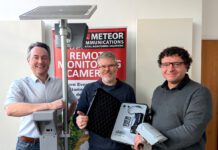
Environmental sector ICT specialist Recycle2Trade has signed up to the national SPRINT (SPace Research and Innovation Network for Technology) business support programme, which is providing funding to support the company in a collaboration with the University of Leicester on a project that aims to use satellite observations of landfills to detect gas emissions and damage to surrounding vegetation.
Recycle2Trade is developing a machine-learning-based data intelligence platform to monitor landfill sites, integrating Internet of Things (IoT) ground detection systems and satellite data from Sentinel-5p and Sentinel-2 missions. This cloud-based solution will provide site operators with early warning of emissions, enabling them to take actions to prevent asset damage and thereby reducing the risk for insurance companies.
The firm will collaborate with the University of Leicester to test the feasibility of the Earth Observation component of the platform. The University will develop a feasibility study and test approaches for the satellite detection of methane emissions at landfill sites, and for the satellite detection of vegetation health changes in the proximity of landfills due to accidents or mismanagement. The project will involve two research teams from the University of Leicester – the Greenhouse Gas Remote Sensing team within the Earth Observation Science group and the Centre for Landscape and Climate Research.
The project will be funded by a grant from the £5 million SPRINT programme that provides unprecedented access to university space expertise and facilities. SPRINT helps businesses through the commercial exploitation of space data and technologies.
Yuri Ponzani, Managing Director of Recycle2Trade said: “We’ve been working on a concept for this innovative project for 15 months and this opportunity to utilise university expertise in satellite data analysis will accelerate us towards the next stage of our technical development.
“In the future, we may look into other sources of data, possibly working with the University of Leicester on other key projects with new opportunities for further innovation.”
Hartmut Boesch, Professor in Earth Observation Science (EOS) at the University of Leicester added: “We’re supporting Recycle2Trade with the analysis of satellite imagery for this feasibility study, focusing on understanding how data can be leveraged to identify methane leakages from landfill sites and the effect of vegetation health, forest and agriculture, and soil pollution.
“The SPRINT project is really exciting for the University and will expand our knowledge base to new fields of research.”
Heiko Balzter, Director of the Centre for Landscape and Climate Research, at the University of Leicester explained: “In this project, we are investigating whether satellites can see where plants are suffering from stress due to pollution from landfill sites. If we succeed, then we hope this will lead to better mitigation measures and targeted remediation.”







